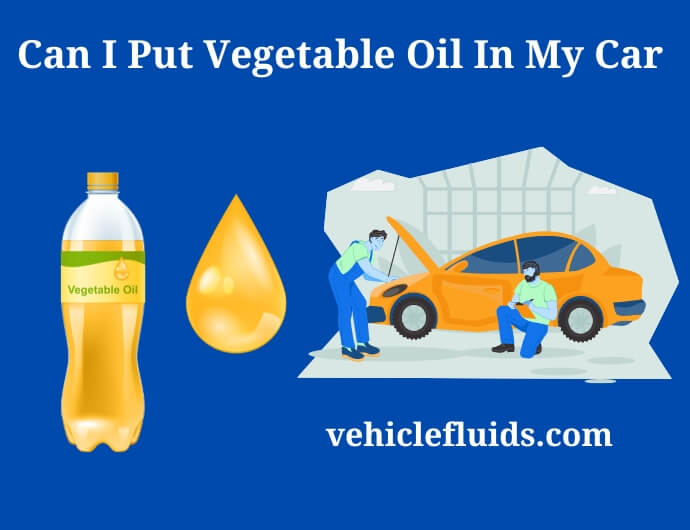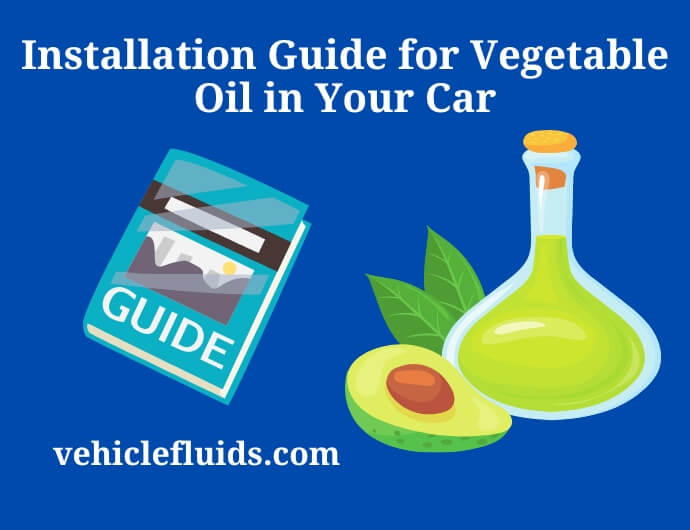Are you wondering if you can put vegetable oil in your car? If so, you’ve come to the right place! In this blog, we’ll discuss the pros and cons of using vegetable oil as fuel for your car and how you can go about doing it.

Vegetable oil is a popular alternative fuel for vehicles that run on diesel engines. It is a renewable and environmentally friendly source of energy that can be used instead of diesel fuel. Some car owners choose to use vegetable oil in their vehicles because it is cheaper than diesel and often easier to obtain. However, before using vegetable oil in your car, it is important to understand the implications of doing so.
While vegetable oil can be used in a diesel engine, it must be converted into biodiesel or processed in a specific way before it can be used. This is because vegetable oil has a higher viscosity than diesel fuel, which can cause problems if it is used directly in an engine. In addition, the use of vegetable oil may void your car’s warranty and may cause damage to the engine if not done properly. Therefore, it is important to do your research and fully understand the process before using vegetable oil in your vehicle.
Definition of Vegetable Oil
Vegetable oil is a type of oil that is derived from various plant sources, such as seeds, nuts, or fruits, and is used for cooking, baking, and as a flavor ingredient in various food products. Vegetable oils are typically high in unsaturated fatty acids and low in saturated fatty acids, which makes them a healthier alternative to animal-based oils. Some common examples of vegetable oils include soybean oil, corn oil, canola oil, and olive oil. Normally vegetable oil uses to cook food.
Vegetable Oil Conversion Kits
The components of a vegetable oil conversion kit typically include a heating system, a filter system, a fuel tank, and a switchover valve. The heating system is used to preheat the vegetable oil to a temperature that ensures the oil is thin enough to flow through the engine and burn efficiently. The filter system removes impurities such as water and dirt from the vegetable oil before it reaches the engine. The fuel tank stores the vegetable oil and is designed to prevent the oil from mixing with the diesel fuel. The switchover valve enables the engine to switch from diesel fuel to vegetable oil and vice versa, depending on the engine’s operating conditions.
The installation of a vegetable oil conversion kit is usually a straightforward process that can be completed by a skilled mechanic or even by a handy person with basic mechanical skills. The installation process involves replacing the existing fuel system components with the components of the vegetable oil conversion kit and making the necessary connections to the engine and the fuel system.
In addition to being environmentally friendly, vegetable oil is also more cost-effective compared to diesel fuel. Since vegetable oil is a by-product of food production, it is usually more readily available and less expensive than diesel fuel. Furthermore, using vegetable oil as a fuel can help reduce the dependency on non-renewable fossil fuels and reduce the greenhouse gas emissions that contribute to climate change.
Can I Put Vegetable Oil in My Diesel Car?
No, you should not use vegetable oil as fuel in a diesel engine designed to run on diesel fuel. Vegetable oil has different properties than diesel fuel, including a higher viscosity and a lower flash point, which can lead to engine damage and decreased performance.
Using vegetable oil as a fuel for a diesel engine requires modifications to the engine and the fuel system to handle the different properties of the oil. Without these modifications, you may experience problems such as clogged fuel filters, reduced fuel efficiency, and damage to the injectors and fuel system components.
It’s always best to use the type of fuel specified by the manufacturer for your vehicle to ensure optimal performance and avoid potential damage to the engine.
Legal Implications of Vegetable Oil
The legal implications of vegetable oil depend on various factors such as the jurisdiction in which it is used, the purpose for which it is being used, and any relevant regulations governing its production, sale, and use.

Vegetable oil must meet certain standards for quality and safety and must be labeled accurately to reflect its contents and any potential allergens. There may also be restrictions on the use of certain types of vegetable oils in food preparation or as cooking oils due to health concerns.
There may be environmental regulations surrounding the production of vegetable oil, including requirements for sustainable agriculture practices and waste management.
It’s important to consult with legal counsel or relevant regulatory agencies to understand the specific legal requirements for the use of vegetable oil in a particular context.
Comparison of Vegetable Oil With Conventional Fuels
Vegetable oil and conventional fuels can be compared in terms of several factors, including:
Energy Content
Conventional fuels, such as gasoline and diesel, have a higher energy content per unit volume compared to vegetable oil. This means that less vegetable oil is needed to generate the same amount of energy as conventional fuel.
Availability
Conventional fuels are widely available in most parts of the world, while vegetable oil may be less available in some areas and more expensive.
Price
Vegetable oil is typically more expensive than conventional fuels, due to factors such as processing and transportation costs.
Renewability
Vegetable oil is a renewable resource, while conventional fuels such as gasoline and diesel are finite and non-renewable.
Environmental Impact
The production and use of conventional fuels can have a significant impact on the environment, including emissions of greenhouse gases and other pollutants. In contrast, vegetable oil is considered to be a cleaner and more environmentally friendly alternative.
Engine modifications
Vegetable oil requires special modifications to be used as a fuel in internal combustion engines, while conventional fuels can be used without any modifications.
Types of Vegetable Oil Suitable for Use in Your Car
If you’re looking for a fuel alternative for your car, you might be wondering if vegetable oil is a viable option. The answer is yes! Vegetable oil can be used as fuel for some vehicles, however, it is important to make sure you are using the right type of oil for your car.
The most common type of vegetable oil used as fuel in vehicles is straight vegetable oil (SVO) or waste vegetable oil (WVO). Some diesel engines can also run on biodiesel, which is a chemically processed form of vegetable oil.
However, it’s important to note that not all diesel engines are designed to run on biodiesel, and using the wrong type of oil can cause damage to the engine. Before using any type of vegetable oil as fuel, it is recommended to consult with a mechanic or the vehicle manufacturer to determine if it’s suitable for use in your car.
You have to know that adding oil to your car is a simple and important task to keep your vehicle running smoothly.
Step-by-Step Guide to Preparing Vegetable Oil for Use in Your Car
Here’s a step-by-step guide to preparing vegetable oil for use in your car:
- Collect and filter the oil: Collect fresh vegetable oil and filter it to remove any food particles or impurities.
- Heat the oil: Heat the oil to remove any water content. This will help extend the life of the oil and ensure it burns cleanly in the engine.
- Store the oil: Store the oil in a clean, airtight container in a cool place to prevent oxidation.
- Modify the car: Modify your car’s diesel engine to run on vegetable oil. This will require adding a fuel tank, a fuel pre-heater, and a fuel injection system.
- Switch over: Once the modification is complete, you can switch over to using vegetable oil as fuel. It’s important to monitor the engine performance and make any necessary adjustments to ensure optimal operation.
Using vegetable oil as fuel may void your car’s warranty, and it’s important to check local laws and regulations to ensure it’s legal in your area. The process of converting a car to run on vegetable oil is complex and should only be attempted by those with experience and technical expertise.
Installation Guide for Vegetable Oil in Your Car
To install vegetable oil in your car, you need to make some modifications to your diesel engine to run on straight vegetable oil (SVO) or waste vegetable oil (WVO). Here’s a general guide on how to do it:

- Choose the type of oil you want to use: SVO or WVO. Make sure it meets the viscosity requirements for your engine.
- Install a secondary fuel tank for the vegetable oil.
- Install a fuel pre-heater to heat the vegetable oil before it enters the engine. This is necessary to reduce the viscosity of the oil and make it flow smoothly.
- Install an electric fuel pump to transfer the vegetable oil from the secondary tank to the engine.
- Install a fuel switch that allows you to switch between diesel fuel and vegetable oil.
- Connect the fuel lines from the fuel tank, pre-heater, and fuel pump, and switch to the engine.
- Modify the engine’s injection system to handle the higher viscosity of vegetable oil.
- Start the engine and check for leaks and proper operation.
This process can be complex and it is recommended to seek professional help or consult with experienced technicians. Improper installation can result in engine damage and safety hazards.
Advantages and Disadvantages of Using Vegetable Oil in Your Car
| Number | Advantage | Disadvantage |
| 1 | Vegetable oils are readily available in many parts of the world. | Most engines are not designed to run on vegetable oil and require modifications to run smoothly. |
| 2 | Vegetable oils are biodegradable and have a lower carbon footprint than fossil fuels. | Vegetable oils are thicker and more viscous than diesel fuel, which can cause clogging of fuel filters and injectors. |
| 3 | In some cases, vegetable oil can be a more cost-effective alternative to diesel fuel. | Vegetable oils can gel or become difficult to pump in cold weather conditions, which can reduce engine performance. |
Monitoring and Maintaining Your Vegetable Oil System
Maintaining and monitoring your vegetable oil system is essential for a healthy and efficient engine. But can you put vegetable oil in your car? The short answer is no – vegetable oil isn’t suitable for use in a car’s internal combustion engine.
Here are some steps to help you monitor and maintain your vegetable oil system:
- Check the oil level regularly and top it up as needed to maintain the recommended level.
- Filter the oil regularly to remove any impurities and extend the life of the oil.
- Monitor the temperature of the oil and keep it within the recommended range to avoid excessive degradation and improve the performance of the oil.
- Check for leaks and cracks in the system and repair them promptly to prevent any oil loss.
- Change the oil at regular intervals, based on the manufacturer’s recommendations and the usage of the system.
- Clean the system regularly to remove any buildup of residue, and to prevent blockages and other problems.
- Store the oil in a cool, dry place, and protect it from exposure to light, heat, and moisture to prevent oxidation and degradation of the oil.
By regularly monitoring and maintaining your vegetable oil system, you can ensure it operates effectively, safely, and efficiently.
Conclusion
Driving with vegetable oil in your car is a unique decision. While it can be a great way to save money and reduce your environmental impact, it’s important to understand the potential consequences.
Running a car on cooking oil is possible, but it’s not as straightforward as just pouring the oil into the gas tank. Cooking oil must be filtered, processed, and refined to remove impurities before it can be used as a fuel. This process can be time-consuming and requires specialized equipment. Additionally, not all vehicles are designed to run on alternative fuels such as cooking oil, so compatibility should be confirmed before attempting to use it as a fuel source.
While using cooking oil as a fuel source may seem like an environmentally friendly alternative, the process of refining the oil and modifying the engine to handle it can offset any potential benefits. It’s recommended to carefully consider the potential drawbacks and weigh them against any potential benefits before deciding to run a car on cooking oil.
